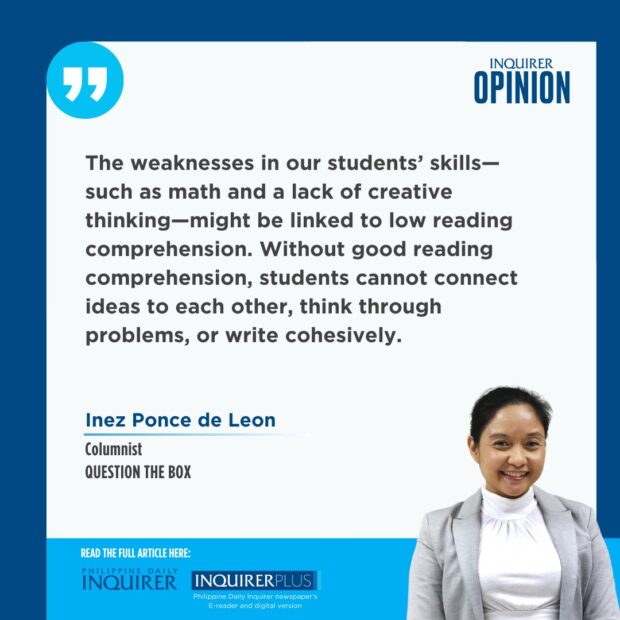The wide reach of reading comprehension

In the last few weeks, I’ve seen online posts from teachers bemoaning their students’ lack of enthusiasm for reading. Our international standardized test scores are down again. And then there’s the National Readership Survey, which says that Filipinos, though having a positive attitude toward reading, read late in their lives, and read less.
All these complaints might have some connection to reading comprehension. Some time ago, there were reports, too, that Filipinos had very low reading comprehension skills. This prompted several people to react, online, and even to write to me: our kids read a lot of stuff on social media, and they understand what they’re reading! They go to book fairs at the mall! They buy books! They’re reading!
What these readers were referring to is literacy, or at least the ability to read something one is interested in. We are not always going to be confronted with our immediate interests, however. We are, at very many points in our lives, going to have to read difficult, much longer material because we need to.
The lack of reading has been addressed in different ways around the world. At home, experts say that parents should read to their children, and should lead by example by reading and referencing newspapers and books when they converse about issues.
In the United States, instructors asked students to name the books that they wanted to read, under the notion that if students started with something that they were interested in, then they would develop the excitement to read other texts. This hasn’t gone according to plan.
Reading comprehension is difficult to define because it is a complex process built on many skills. Steve McKee, in a 2012 journal article for Language Testing in Asia, discusses how reading comprehension is built on different mental tasks: lower-level tasks include recognizing words; higher-level tasks include recognizing meaning. Good readers, therefore, understand what they are reading, analyze it, and interpret it.
Other researchers add that comprehension must include knowing why one is choosing to read something, asking questions about the text, anticipating what an author should logically say, critiquing the author’s conclusions if they don’t flow logically, and recognizing the structure of what one is reading. While these seem difficult, they are tasks we already do intuitively if we read out of habit.
There, too, are many other variables that enrich comprehension: prior knowledge of the content of the text, prior knowledge of the context in which it was written, and an ability to connect both prior knowledge and context to the content at hand. This last piece is important: it means that a good reader must know which prior information is most pertinent to the current text, what information is contradicted and if it warrants a change in opinion, and how the current text and its context can deepen the reader’s understanding of an issue.
Measuring reading comprehension is understandably complicated. Asking fact-based questions using a multiple-choice format can measure only what information a reader can recall, but this format can be gamed by guessing answers, sometimes without reading the text. Short essay questions might be more reliable, but not all good readers are also good writers, and those who have only a burgeoning writing hand will be put at a great disadvantage even if they read the text well.
Reading comprehension is not a skill that exists on its own. Because it fosters making mental connections and thinking critically, those who read widely can be better writers. They also function better in social situations. For instance: instead of reacting outright to a text with which they might disagree, a good reader seeks out multiple sources of information before passing judgment. Good readers don’t pick fights over things read or said in haste.
Research by Malaysian educators in a 2013 article in English Language Teaching shows that good reading comprehension improves problem-solving skills, which is not surprising since reading comprehension also includes the ability to identify the assumptions underlying a text. A 2017 article in the Universal Journal of Educational Research, carried out by Turkish researchers, shows that active reading increases one’s attention span and concentration even for other tasks.
Those who read widely also develop more empathy and understanding. By comprehending literary texts, readers have to identify how characters feel, predict what characters might do, and understand why characters do what they do.
The weaknesses in our students’ skills—such as math and a lack of creative thinking—might be linked to low reading comprehension. Without good reading comprehension, students cannot connect ideas to each other, think through problems, or write cohesively.
These are skills that they will have to be taught to survive the rest of their lives. We cannot simply expect students to read on their own, or we risk crippling their futures.
iponcedeleon@ateneo.edu




















